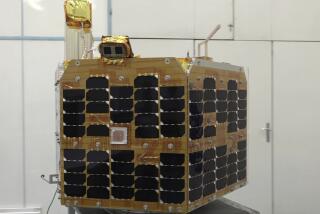Rocket Lab’s Electron rocket reaches space, but not orbit, in first test flight

Huntington Beach small-satellite launch firm Rocket Lab launched its Electron rocket for the first time in a test Wednesday night. The rocket made it to space, but not to orbit.
In a significant step for one of Southern California’s growing private space startups, Rocket Lab said its Electron rocket made it to space in its first test flight Wednesday night, but did not reach orbit as planned.
The test launch of the rocket, which did not have a satellite aboard, was the first of three planned by Rocket Lab.
Rocket Lab faces pressure to prove its rockets are reliable so it can move on to commercial service, said Bill Ostrove, aerospace and defense analyst at Forecast International. The company has secured contracts with customers such as NASA and Earth-imaging firm Planet.
The Electron rocket lifted off at 9:20 p.m. Pacific time Wednesday from Rocket Lab’s private launch complex on New Zealand’s Mahia Peninsula.
After a “great” first-stage burn, the company said, the first and second stages of the rocket separated cleanly, followed by ignition of the second-stage engine. Then the fairing — the clamshell-like covering that protects satellites and other payloads at the tip of the rocket — separated as expected.
The rocket was intended to reach an elliptical orbit, about 186 to 310 miles above Earth at an 83-degree inclination. The Electron ended up reaching an altitude of about 155 miles.
Huntington Beach-based Rocket Lab did not release further details about what happened after the rocket’s fairing separated. Chief Executive Peter Beck told reporters on a conference call Thursday morning that the company was still reviewing data from the flight.

Rocket Lab’s Electron rocket made it to space, but not orbit, in its first test flight Wednesday night. The small-satellite launch company based in Huntington Beach will attempt a second test flight in the next few months.
The company said in a statement late Wednesday night that it would comb through the 25,000 data channels collected during the test flight and figure out why the rocket did not reach orbit, as well as figure out improvements to the vehicle.
“We’re really happy with what we achieved yesterday,” Beck said on the call. “We got through all the critical events.”
Although the company would have liked to reach orbit on its first go, he said Wednesday’s launch puts Rocket Lab “well ahead for the next test flight and into commercial operations.”
He has said the top priority of this first test flight was to “gather enough data and experience to prepare for a commercial phase.” Rocket Lab said it will aim to reach orbit in its second test flight, which could happen in the next few months.
The launch was delayed by three days because of weather conditions at the company’s private launch complex. Rocket Lab completed construction on the launch complex in September.
Rocket Lab is building a business around the burgeoning small-satellite market.
Thanks to technological advancements that slashed satellite development and launch costs, a number of companies, including SpaceX, OneWeb and Boeing, have proposed “constellations” of hundreds or even thousands of small satellites that would provide low-cost broadband Internet access.
To meet the expected demand for launches, companies such as Rocket Lab are tailoring their rockets to give these small satellites a dedicated ride to space.
Small satellites currently hitch a ride into space by squeezing onto rockets purchased by larger companies that are deploying their own satellites or other payloads. In February, Planet launched 88 of its small satellites aboard the Indian Space Research Organization’s PSLV rocket. That rocket’s primary mission was to deliver a larger Earth observation satellite to orbit.
Aspiring small-satellite launch providers say their services will allow small satellite firms to have more say in the timing of launches, as well as the orbit where the satellite will be placed.
Tucson-based Vector Space Systems launched a test of its Vector-R rocket earlier this month in Mojave, Calif. Another industry player, Long Beach-based Virgin Orbit, is aiming to test LauncherOne — a satellite-launching rocket that will be dropped from beneath the wing of a Boeing 747 — for the first time by the end of the year.
The Electron is small — about 56 feet long, with a diameter of about 4 feet — and is intended to lift small satellites or other payloads weighing up to 330 pounds to a low orbit.
The rocket’s first stage is composed of nine Rutherford engines, which are powered by liquid oxygen and kerosene. The company said it used 3-D printing for all of the primary components of the Rutherford engine.
Customers were able to watch via feeds provided by the company, and the Rocket Lab board of directors was in New Zealand for the launch.
The launch was not publicly webcast to avoid pressuring the team, Beck said, but he said the next test flight probably would have a live stream available to the public.
Twitter: @smasunaga
UPDATES:
May 25, 12:35 p.m.: This article was updated with more details of how small satellites currently get to space.
May 25, 10 a.m.: This article was updated with details from a conference call.
May 25, 7:30 a.m.: This article was updated with more detail about the rocket’s test flight.
May 25, 6:55 a.m.: This article was updated to include more information about the Electron rocket’s test flight and comment from Rocket Lab Chief Executive Peter Beck.
This article was originally published on May 24 at 10 p.m.
More to Read
Inside the business of entertainment
The Wide Shot brings you news, analysis and insights on everything from streaming wars to production — and what it all means for the future.
You may occasionally receive promotional content from the Los Angeles Times.











